Lü Bu
| Lü Bu | |
|---|---|
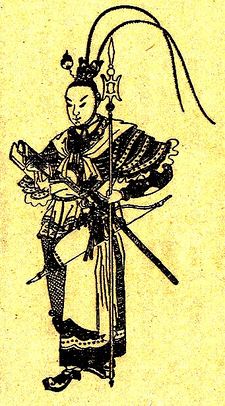 |
|
| Minor warlord | |
| Born | ? |
| Died | November 7, 198 |
| Names | |
| Simplified Chinese | 吕布 |
| Traditional Chinese | 呂布 |
| Pinyin | Lǚ Bù |
| Wade-Giles | Lü Pu |
| Courtesy name | Fèngxiān (奉先) |
- This is a Chinese name; the family name is Lü.
Lü Bu (died November 7, 198)[1][2] was a military general and later a minor warlord during the late Eastern Han Dynasty. According to the Records of Three Kingdoms, Lü Bu was highly-skilled in horse-riding and archery, and was thus nicknamed "Flying General". His image as a handsome and mighty warrior wearing a pheasant-tailed headdress and wielding a ji known as the "Sky Piercer" (Chinese: 方天畫戟; pinyin: Fāngtiān Huàjǐ) on top of his steed Red Hare was later popularized by the 14th-century historical novel Romance of the Three Kingdoms. In the story, he is considered the single most powerful warrior in all of China and comparable to the Greek hero Achilles in prowess.
Besides being matchless on the battlefield, especially in man-on-man duels, Lü Bu was also notorious for having betrayed and slain two separate lords (who were both his adoptive fathers). He was perhaps most well-known for his amorous relationship with the possibly fictional Diao Chan, which led to his slaying of Dong Zhuo, the tyrannical warlord who held the Emperor Xian in control as a puppet ruler. Throughout the semi-fictional novel Romance of the Three Kingdoms, Lü has been depicted as a ruthless and impulsive warrior who has no sense of loyalty and sympathy.
Lü Bu was eventually defeated and captured by Cao Cao at the Battle of Xiapi. At Liu Bei's suggestion, Cao Cao had Lü Bu killed by hanging.
Contents |
Biography
Service under Ding Yuan
Lü Bu was a local of the county of Jiuyuan in the Wuyuan Commandery (a district of present day Baotou, Inner Mongolia). He started his career as the Chief Secretary under the governor of Bing Province (并州), Ding Yuan. In 189, Ding led his troops into the capital city of Luoyang to assist General-in-Chief He Jin in eliminating the powerful eunuch faction. He Jin was assassinated and the Luoyang plunged into chaos when imperial forces and the eunuch faction clashed.
Service under Dong Zhuo
Dong Zhuo, a warlord from Liang Province who was summoned to Luoyang by He Jin, seized control of the armed forces of Luoyang and rose to power. Lü Bu betrayed and killed Ding Yuan, severed Ding's head and presented it to Dong Zhuo as a gesture of allegiance. Dong also acknowledged Lü as his foster son. To consolidate power, Dong deposed Emperor Shao and replaced him with Emperor Xian, who was actually a puppet ruler under his control, and moved the capital city to Chang'an in the west. Dong's evident intention of usurping state power, compounded by his tyranny and cruelty, angered many loyalists and placed him in a vulnerable position to political assassination. For his personal safety, Dong Zhuo relied heavily on Lü Bu, who was promoted to "Knight General" (中郎將). Lü Bu would be at Dong's side almost all the time as a personal bodyguard.
In his frequent bouts of temper, Dong would hurl a halberd at Lü Bu to vent his frustration. Lü dodged the weapons easily and Dong's fury subsided quickly. Nevertheless, Lü bore a furtive displeasure towards his foster father for that. Moreover, as Lü Bu had access to Dong's residence, he started an amorous affair with one of Dong's servant maids, and was constantly in fear of being discovered by his foster father.
In 192, with encouragement from Interior Minister Wang Yun, Lü Bu decided to kill Dong Zhuo. He brought a dozen trusted men, including Cavalry Captain Li Su, to greet Dong Zhuo one morning at the palace gate. Li stabbed Dong and Dong cried out for Lü Bu to save him. However, Lü said, "This is an imperial order." and delivered a fatal blow to Dong Zhuo.
Roaming the land
After Dong Zhuo's death, the central government did not grant amnesty to Dong's former followers and they attacked Chang'an. Within ten days, Chang'an fell to Dong's subordinates Li Jue and Guo Si, and Lü Bu was forced to flee after his defeat. State power fell into the hands of Dong's followers once more. Lü Bu went to the warlord Yuan Shu in Yangzhou and requested to join Yuan. Yuan refused to accept Lü Bu as he was deterred by Lü's fickleness.
Lü Bu then headed north to join Yuan Shao and he helped Yuan defeat the bandit army led by Zhang Yan. As Lü Bu's force gradually grew in strength, Yuan Shao began to see him as a potential threat. Lü was aware of that himself so he left Yuan Shao swiftly and avoided the assassins Yuan sent after him.
In 194, when Cao Cao was away on a campaign against Tao Qian in Xu Province, his subordinates Zhang Miao and Chen Gong rebelled and allowed Lü Bu's forces to take over Yan Province. Gao Shun helped Lü defeat and drive away Cao Cao's army. When Cao heard that Yan Province had fallen into Lü Bu's hands, he turned back and besieged Lü at Puyang. After more than 100 days of stalemate, a famine forced Lü Bu to abandon the city.
Occupation of Xu Province
After abandoning Puyang, Lü Bu headed for Xu Province to seek refuge under the new governor Liu Bei. In 196, Lü turned against Liu and seized the city of Xiapi, effectively taking over governorship of Xu Province, forcing Liu to move to the nearby town of Xiaopei (小沛; present-day Pei County, Anhui).
In the same year, Yuan Shu sent an army led by Ji Ling to attack Liu Bei. As Lü Bu feared that the loss of Xiaopei would expose him to attack from Yuan, he led his men to lay camp south of Xiaopei, where he sent invitations for Liu Bei and Ji Ling to meet him. Lü Bu urged both sides to make peace and extracted promises from them to withdraw their troops if he could hit the sharp tongue of a halberd, erected at the gate, with an arrow. From afar, Lü fired an arrow and it came squarely on its target. Both Liu Bei and Ji Ling kept their promises and retreated.
To counter Cao Cao's rising power, Yuan Shu offered to form an alliance with Lü Bu. Lü agreed initially but regretted afterwards. He sent his men to retrieve his daughter (born to Lady Yan), who was on her way to be married to Yuan's son. Lü also imprisoned Yuan Shu's envoy and sent the captive to Cao Cao as a token of friendship.
Downfall and death
In 198, Lü Bu switched his allegiance to Yuan Shu again and attacked Liu Bei at Xiaopei. Liu went to join Cao Cao and Cao led his army to attack Xu Province. After three months of siege and many consecutive defeats, Lü Bu's subjects were low in morale and some of them defected to Cao Cao's side. Lü Bu had no choice but to surrender eventually. In some accounts, Lü Bu was betrayed by his subordinates, who tied him up while he was asleep, and presented him to Cao Cao. Lü Bu was bound and brought before Cao Cao, to whom he pledged his service. When Liu Bei reminded Cao about the fate of Ding Yuan and Dong Zhuo, Cao condemned Lü Bu to death by hanging.
In Romance of the Three Kingdoms
Romance of the Three Kingdoms, a historical novel by Luo Guanzhong, was a romanticization of the events that occurred before and during the Three Kingdoms era. It portrayed Lü Bu as an invincible warrior but an incapable leader who is further marred by character flaws. While adhering to factual history in the general course of events, Luo exaggerated or sentimentalised many stories about Lü Bu, drawing inspirations from folklore and traditional operas. The following are some of the stories of Lü Bu in the novel that differ from historical accounts:
Defection to Dong Zhuo
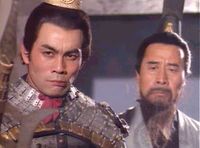
Lü Bu first appeared in Chapter Three as the foster son of Ding Yuan. When Dong Zhuo proposed to depose Emperor Shao, Ding opposed Dong's decision and denounced him as a traitor. Dong wanted to kill Ding for that but he refrained when Lü Bu stood forward to defend his foster father. Li Su, a general serving under Dong who was an old friend of Lü Bu, volunteered to persuade Lü to defect over.
Li Su went to see Lü Bu, bringing with him the Red Hare, a thousand taels of gold, dozens of pearls and a jade belt. Li succeeded in persuading Lü to defect, as Lü was moved by Dong's gifts and he felt that following Ding Yuan would not brighten his future. That night, Lü murdered and decapitated Ding Yuan, bringing the head to see Dong Zhuo the next morning. Dong was overjoyed and accepted Lü Bu as his foster son, appointing him as a high-ranking military officer and showering him with gifts. Lü Bu served as Dong's personal bodyguard from then on.
Battle with the three heroes at Hulao Pass
Dong Zhuo's tyranny and cruelty incurred the anger of many people, so in 190, several regional governors and warlords formed a coalition army under Yuan Shao's leadership to attack Dong.
The coalition forces were victorious in the early battles until they reached Hulao Pass, 50 Li away from the capital city Luoyang. Lü Bu came forth to challenge the coalition army, riding on his Red Hare, clad in the finest silver armour and donning a pheasant-tail headdress. Generals from the coalition, Fang Yue and Mu Shun, were slain by Lü Bu in one-on-one duels, while Wu Anguo's wrist was cut off and had to retreat. The warlord Gongsun Zan fought with Lü personally but was no match for him and had to retreat as well. Just then, Zhang Fei appeared, insulting Lü Bu as "a bastard slave with three surnames (since he had his own name and had two adoptive fathers)". Zhang struggled against Lü Bu for more than fifty rounds but neither side was able to gain an advantage. Before long, Guan Yu and Liu Bei joined in the fight consecutively, but Lü Bu still managed to hold on. Eventually, as he grew weary, Lü Bu fought his way out and retreated back to the pass.
Killing Dong Zhuo
After Lü Bu's retreat, Dong Zhuo abandoned Luoyang and moved the capital city to Chang'an in the west. Interior Minister Wang Yun devised a plot to sow discord between Lü Bu and Dong Zhuo, intending to make use of Lü to kill the tyrant. Wang invited Lü Bu to his residence for a banquet one evening and captured Lü's attention with his servant girl Diao Chan. Lü Bu was entranced by Diao Chan's beauty and was overjoyed when Wang promised to let her marry him. A few days later, Wang repeated the scenario, this time with Dong Zhuo as the guest in his house. Wang allowed Dong to bring Diao Chan home and she became Dong's concubine.
The angry Lü Bu confronted Wang Yun later and accused Wang of breaking his promise. Wang feigned ignorance and lied to Lü Bu that Dong had brought Diao Chan home so he could see his prospective daughter-in-law before her marriage. Lü's anger subsided after hearing that and he apologized to Wang before leaving. The next morning, Lü Bu headed to Dong's bedroom and saw Diao Chan looking at him, with a sorrowful expression on her face. When Dong fell ill, Lü used the opportunity to see Diao Chan under the pretext of visiting his foster father. When Dong caught Lü Bu staring at his concubine, he was furious and forbid Lü from entering his inner rooms from then on.
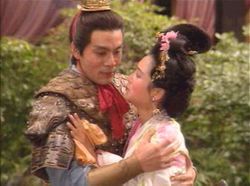
One day, when Dong Zhuo was out, Lü Bu sneaked into his house to see Diao Chan. At Fengyi Pavilion, Diao Chan lied to Lü Bu that she was no longer a virgin and felt ashamed to see Lü. She attempted suicide but Lü Bu stopped her. Lü was moved and believed that Dong had taken Diao Chan, rightfully his, from him by force. Just then, Dong returned and saw the pair locked in a tight embrace. He was furious and chased after Lü Bu, who fled, with a halberd in hand. Dong hurled the weapon at Lü, who dodged it narrowly and escaped. Dong returned to Diao Chan and chided her for infidelity, but Diao Chan replied indignantly that it was Lü Bu who embraced her against her consent. She attempted suicide once more to prove her loyalty to Dong, who was moved and he trusted her.
After that incident, Lü Bu became increasingly displeased with Dong Zhuo, although Dong attempted to "patch-up" by sending him gifts. Wang Yun seized the opportunity to instigate Lü Bu into killing Dong Zhuo, by warning Lü that he would be remembered in history as a Han traitor and corrupt general for serving a villain like Dong Zhuo. When Lü claimed that he could not bear to betray two adoptive fathers, Wang replied, "Dong Zhuo's surname is Dong, while yours is Lü. Did he consider you as his son when he threw that halberd at you?". Lü Bu eventually made up his decision to kill Dong. Wang sent Li Su to fetch Dong to the palace, claiming that the emperor had decided to abdicate and pass the throne to Dong. Dong was ambushed by Wang Yun's men at the palace gate and he cried out for Lü Bu to save him. Lü appeared and said coldly, "I've an imperial order to kill the traitor Dong Zhuo.", before delivering a fatal blow.
Lü Bu's downfall
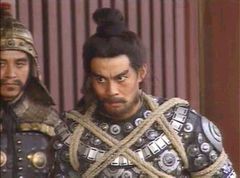
In 198, Cao Cao and Liu Bei formed a temporary alliance against Lü Bu and attacked him in the Battle of Xiapi. Lü Bu's forces were besieged inside the city for two months. Cao Cao's advisors Xun Yu and Guo Jia then suggested to their lord to flood Xiapi by directing water from the Yi and Si rivers. Lü's advisor Chen Gong suggested that he should lead a group of soldiers outside the city gate before the water level is too high, while Chen himself will lead another group to a different direction. Both groups will then coordinate a two-pronged attack on Cao Cao's army and should be sufficient to force him to retreat. However, Lü's wife, Lady Yan, complained that he hardly spent time with his family and persuaded him to stay in the city and defend it until Cao's forces retreat. As the city gates were flooded, Lü Bu's men rushed to inform him but Lü dismissed the warning, thinking that his Red Hare would help him escape. Lü Bu was heavily indulging in alcohol and women at that time, but one day he decided to abstain from wine after seeing his own reflection in the mirror. He issued an order banning his men from consuming alcohol. One day, Hou Cheng, one of Lü Bu's generals, caught a defector attempting to steal fifty horses. He prepared some wine to celebrate his achievement with his colleagues and presented five bottles to Lü Bu. Lü was enraged when he saw that Hou defied his order and had Hou flogged. The unhappy Hou Cheng then plotted with Song Xian and Wei Xu to defect over to Cao Cao. At night, Hou stole Lü Bu's Red Hare and fled from the city towards Cao's camp.
The next morning, Cao Cao's troops launched a fierce attack on the city, forcing Lü Bu to participate in the defense personally. The battle dragged until late noon and the exhausted Lü Bu took a nap. Song Xian and Wei Xu took the opportunity to tie Lü Bu up and they hoisted a white flag and threw Lü Bu's weapon down the city wall. With help from the defectors, Cao Cao's army broke into the city and captured it swiftly. Lü Bu was bound and brought before Cao Cao at White Gate Tower. He pledged his service to Cao and Cao, who had a penchant for recruiting talents, was almost swayed by Lü Bu's words. Just then, Liu Bei reminded Cao Cao of the fates of Ding Yuan and Dong Zhuo and Cao Cao changed his decision. Lü Bu stamped his foot in anger and hurled abuse at Liu Bei. Cao Cao then ordered for Lü Bu to be executed by hanging and Xiaoshou (梟首; the corpse to be decapitated and the head put on display).
In other media
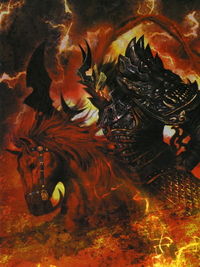
Because of his reputation as an unmatched and highly skilled warrior in the Three Kingdoms saga, Lü Bu is often held in high regard in works based on the Three Kingdoms, sometimes even in works not based on the Three Kingdoms. These include video games, where he is often given the highest War/Attack stats, and in anime and manga. Some examples for these are listed below.
- Lü Bu is a character in the Koei video game series Romance of the Three Kingdoms, usually as one of the icon characters. He is generally the only character in the game with the maximum "War" statistic, but has abysmal "Intelligence" and "Politics" statistics to reflect his historical failures. The sum of all of his statistics added up is only 266 out of a maximum of 500[3][4]. It is a must to pair Lü Bu with an officer of high "Intelligence" in battle, otherwise any unit can and will confuse Lü Bu in this series.
- Lü Bu is a character in the popular game series Dynasty Warriors where he is usually the strongest character and wields a powerful halberd. He is most often portrayed wearing the pheasant-tailed headpiece he wore, as in his traditional image. In Dynasty Warriors 6 he dresses in black armor, wielding twin double ended halberds and having a red pheasant-tailed headpiece. He is known as a powerful warrior, and the series emphasizes this with his catchphrase "Can nobody provide me with a decent challenge?!"[5]
- In Warriors Orochi, Lü Bu serves Orochi as one of his top officers. In this crossover series between Dynasty Warriors and Samurai Warriors, Lü Bu finally found a worthy challenger to fight him, Honda Tadakatsu, who leads an independent force against Orochi, and is constantly looking for a chance to duel him. He also seeks to one day challenge Orochi himself. In the sequel game, he still served Orochi, but eventually went on to betray him too and formed up his own force, temporarily allying with Wu.
- In Capcom's Destiny of an Emperor for the NES Lü Bu appears as a character with the highest attack stat. In the game, the player is capable of recruiting him into Liu Bei's party albeit only temporarily. Unique among the various portrayals of the character, in Destiny of an Emperor (and the manga it is based upon, Tenchi o Kurau) Lü Bu is depicted as a singular blond caucasian man among the other Chinese characters, suggesting that his uncommon strength and height was due to European, as opposed to Han, ancestry.
- Lü Bu is one of the fighters in the Neo Geo's World Heroes 2 Jet, although his name is instead "Ryofu," the Japanese pronunciation of his name.
- The character Ryofu Housen (Japanese pronunciation of Lü Bu Fengxian), in the anime short series Ikki Tousen, is also roughly based on Lü Bu.
- In the manga and OVA anime Ryofuko-chan [1], Lü Bu is reincarnated as the elementary school student Ryofuko.
- In the collectible card game Magic the Gathering there is a card named Lu Bu, Master-at-Arms, in the Portal: Three Kingdoms set.
- In Fate/Extra, Lu Bu is one of the Berserker-class Servants.
References
- ↑ de Crespigny, Rafe (2007). A biographical dictionary of Later Han to the Three Kingdoms (23–220 AD). Brill. p. 624. ISBN 978-90-04-15605-0.
- ↑ de Crespigny, Rafe. "To Establish Peace: being the Chronicle of the Later Han dynasty for the years 189 to 220 AD as recorded in Chapters 59 to 69 of the Zizhi tongjian of Sima Guang". Volume 1. Faculty of Asian Studies, The Australian National University, Canberra. 1996. ISBN 0-7315-2526-4. Section Jian'an 3, p. 49.
- ↑ http://kongming.net/11/i/p/?p=487-Lu-Bu_A
- ↑ http://kongming.net/11/i/p/?p=487-Lu-Bu_B
- ↑ http://www.youtube.com/watch?v=1MNONh8ovSM
- Chen Shou (2002). San Guo Zhi. Yue Lu Shu She. ISBN 7-80665-198-5.
- Luo Guanzhong (1986). San Guo Yan Yi. Yue Lu Shu She. ISBN 7-80520-013-0.
- Lo Kuan-chung; tr. C.H. Brewitt-Taylor (2002). Romance of the Three Kingdoms. Tuttle Publishing. ISBN 0-8048-3467-9.
See also
- Three Kingdoms
- Personages of the Three Kingdoms
- Records of Three Kingdoms
- Romance of the Three Kingdoms
- Three Kingdoms Online
|
|||||||||||||||||
